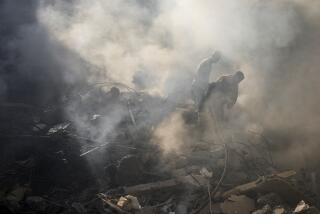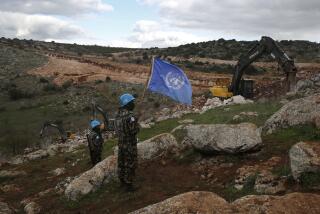2 U.N. Peacekeepers in Lebanon Slain
JERUSALEM — Two Austrian soldiers serving with a United Nations observer force on the Golan Heights were shot and killed Friday while on a midday foot patrol in a largely uninhabited area, a U.N. spokesman said.
Also Friday, the U.N. peacekeeping force in southern Lebanon accused Lebanese Hezbollah guerrillas of harassing its troops and threatening Polish and Irish soldiers at gunpoint in several recent episodes.
For the record:
12:00 a.m. June 1, 1997 For the Record
Los Angeles Times Sunday June 1, 1997 Home Edition Part A Page 3 Metro Desk 1 inches; 25 words Type of Material: Correction
U.N. peacekeepers--A headline in Saturday’s editions of The Times misidentified the location where two U.N. peacekeepers were slain. They were killed in the Golan Heights.
The two events, apparently unrelated, made for a “bad day or so” for U.N. troops assigned to the volatile region, said Timor Goksel, spokesman for the peacekeeping force in Lebanon.
Goksel said the two Austrians were killed while patrolling a remote area of the Golan on the Syrian side of the demarcation line between Israeli and Syrian troops. Israel captured the strategic plateau from Syria in the 1967 Mideast War and has held it since.
The soldiers’ bodies were discovered by others who went to look for them when they did not return from patrol. The weapon of one of the soldiers was missing, the spokesman said, and investigators were trying to determine a motive for the killings.
The area is generally so peaceful that the U.N. troops are allowed to patrol it in pairs rather than in larger groups, Goksel said.
The 1,050-member force has been deployed in the area since 1974.
In southern Lebanon, meanwhile, U.N. troops assigned to the area have allegedly been harassed and threatened by gunmen belonging to Hezbollah, a pro-Iranian Muslim movement.
Hezbollah is fighting to expel Israeli forces from a 9-mile-wide swath of territory that Israel claims as a “security zone” along the Israeli-Lebanese border. On Friday, the group claimed responsibility for attacking an Israeli armored patrol with rockets and machine guns, seriously wounding at least one Israeli soldier.
Goksel said that twice Thursday and again on Friday Hezbollah guerrillas stopped U.N. soldiers, forced them to lie on the ground and held guns at their heads while their identity papers were checked.
In the most recent incident, rifle shots were fired near several Irish soldiers, he said. In each case, the gunmen said they wanted to ensure that the foreign soldiers were not Israelis.
Goksel said the incidents, the first of their kind in about 10 years, apparently resulted from recent Hezbollah concerns that several used U.N. vehicles purchased by a Lebanese businessman might be used to secretly ferry Israelis into southern Lebanon.
U.N. officials explained that the secondhand trucks had no connection to Israel, but Hezbollah radio and television stations broadcast the group’s concerns about the vehicles Wednesday. The first U.N. troops were stopped the next day.
In a statement issued in Beirut, a Hezbollah spokesman said the United Nations had exaggerated.
“What happened did not exceed precautionary measures taken by the resistance and inhabitants to protect the liberated areas and civilians from any Zionist infiltration attempt in [U.N.] vehicles,” the spokesman said, according to the Reuters news agency.
Goksel described the gunmen who stopped the U.N. troops as “youngsters” who were evidently persuaded by the broadcasts to take matters into their own hands.
He said the U.N. had protested to Hezbollah leaders in southern Lebanon and received assurances that such incidents will not recur.
More to Read
Sign up for Essential California
The most important California stories and recommendations in your inbox every morning.
You may occasionally receive promotional content from the Los Angeles Times.










